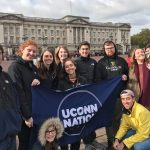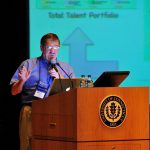Julie M. Wood ’71 (ED), ’72 MA, a renowned educational consultant, decided to leave a planned gift to UConn to support research in an area close to her heart: children’s literacy. She has set up an endowment that will generate funding every year for a faculty member in the Neag School of Education to conduct research in effective practices to support children’s literacy development.
UConn researchers, including Neag School’s Devin Kearns, collaborate with schools across the country to help identify kids at risk of dyslexia. The AppRise project uses a free, game-like app to help teachers assess kids as young as five and get them the help they need to learn to read.
Each of the Neag School’s 2020 Alumni Award honorees represent the best and brightest in their field. It is our privilege to celebrate all that they have accomplished through their careers and their service to the community.
On the way home from a hip-hop education conference last year, Justis Lopez ’14 (ED), ’15 (MA) and his colleague Ryan Parker were unpacking what they had learned and what they were feeling that day. They started to freestyle rap and found themselves filled with joy, repeating the verse ‘I’m feeling so happy.’ Their freestyling turned into a song called “HAPPYVISM” that is now part of a greater initiative they have named Project Happyvism.
Associate Professor David Moss has spent the past six years actively expanding Neag School study abroad programs around the world as the Neag School’s global education director, and the past 20 years coordinating UConn’s long-standing London study abroad program in education.
Joseph Renzulli served as founding director of the Neag Center, the Lynn and Ray Neag Endowed Chair for Talent Development, as well as the first director of the National Research Center on the Gifted and Talented (NRC/GT), then one of a dozen centers in the U.S. focused on addressing significant issues in the education of gifted and talented students, and enrichment education. Under Renzulli’s guidance, the Neag Center evolved into one of the leading centers in gifted education and talent development in the world.
Since the 1900s, U.S. public schools have employed a growing number of school resource officers (SROs) – defined here as sworn law enforcement officials. In 1975, only 1% of schools reported having police officers on site, but by 2018, approximately 58% of schools had at least one sworn law enforcement official present during the school week.
“Our number-one goal is to enhance the quality of life of those with developmental disabilities and that of their families,” says early childhood intervention expert Dr. Mary Beth Bruder, the UCEDD’s director and professor of public health sciences and pediatrics at the UConn School of Medicine and Neag School of Education. “A qualified workforce to help accomplish this goal is critical for all of society.”
On September 22, the Duke University Talent Identification Program (Duke TIP) welcomed Dr. Del Siegle, who is a professor in the University of Connecticut’s Neag School of Education and the director of the National Center for Research on Gifted Education (NCRGE), to deliver a presentation entitled “Report from the NCRGE: Problems and Promising Practices in Gifted Education.”
D.C. turned to the Schoolwide Enrichment Model (SEM), used in more than 4,000 schools nationwide, and internationally. Joseph Renzulli and Sally Reis, professors at the University of Connecticut’s Neag School of Education, created their model to help diversify accelerated classes and gifted programs by encouraging school systems to broaden their concept of giftedness and ferret out student potential beyond what’s measured by standardized tests. The method assesses qualities such as motivation, curiosity, empathy, creativity and self-regulation, and exposes young students to a wide range of enriching experiences to discover what excites them.





